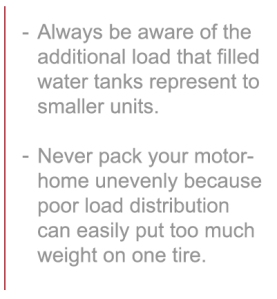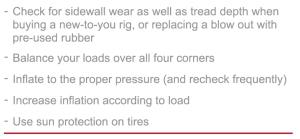It’s a good news/bad news scenario concerning tires. First, let’s break the bad news: tires depreciate as soon as they roll out of the factory. A bleak thought, especially when you consider the substantial expense of purchasing tires for your recreational vehicle.
But now for the good news: as a responsible RV owner, you can extend the life of your tires, combat the deterioration process that’s been set in motion from the birth of a tire, and make sure your RV is safely ready to roll whenever you are. Tire failure does occur, and the common causes behind that failure are as varied as the scenery you’ve encountered on your many RV road trips. Ensuring that you have a robust roadside assistance program in place well before you venture out on the open road is prudent. Your personal safety and the safety of your passengers is priority number one.
Why Tires Fail Before Their Time
Most RV owners can expect about five years from a new set of tires. Proper tire care, regular inspection and periodic maintenance may eke another year or two of tire life. When a tire fails, it can not only cause extensive damage to the body of an RV, or shocks, etc., but it can also pose a life-threatening situation to you and your passengers if a blowout causes the driver to lose control of the vehicle. Additionally, bits of tire from a blowout create a hazard to other drivers who are sharing the road with you. Invaluable roadside assistance programs enable you to get back on the road by arranging to have a flat changed, providing you with a comparable new tire, or towing you to a repair facility. It can’t, however, undo damage done to you, your loved ones or other travelers. Take precautions against tire failure to avoid disastrous trip scenarios.
 The main offenders behind untimely tire failure include:
The main offenders behind untimely tire failure include:
- Overheating due to under-inflated tires — It’s a given that tires lose air over time. Temperature fluctuations and road use impact tire pressure, so it’s extremely important to check tire pressure periodically. Under-inflated tires generate a lot of heat while they’re rolling down the road. More rubber comes into contact with the road surface, causing excess friction and, therefore, overheating.
- Loading your RV to the hilt and improper weight distribution — An overloaded motor coach or other recreational vehicle leads to under-inflated tires. Too much stress on one or more tires can mean premature tire failure on the open road.
- Dry rot from sun (UV) damage — The sun is notorious for setting physical or chemical changes in motion. Your RV tires are no exception. Destructive UV rays affect a tire in such a way that damage to the integrity of the tire’s rubber may be nearly invisible. If you detect any cracking or splitting, especially on the tire’s sidewalls, the tire is unsafe.
- Old tires that appear hale and hearty — A ten-year-old tire may have excellent tread, look good and appear road-worthy. But tires are meant for rolling down the open road, not for standing still. Over time, the material that makes up a tire begins to deteriorate.
Here are a few tips that can prevent the potential tire problems listed above:
- Check tire pressure with a trusted tire gauge every day you’re on the road, and every month when you’re not.
- Have your RV weighed to ensure proper weight distribution
- Cover tires to protect against damaging UV rays
- Examine tires for defects
- Read the DOT’s sidewall information to determine tire age
- Have a reliable roadside assistance plan in place before your RV adventure




The suggested tire pressure in most owners manuals for RV’s is NOT what is required. My experience was that I followed the manufacturers specs for inflation, and after 3 years had to replace all 6 tires .
The reason?? Grossly under inflated tires, inflated to the RV manufacturers specs. Get 4 corner weighing done!!
If you want the tires to last at least 6 or 7 years inflate them to the Maximum inflation pressure marked on the sidewall, and check pressures every driving day, as temperatures can affect inflation pressure.
Every 10 degrees of temperature change results in 1 pound of pressure change, so if you travel from Canada to the southern U.S. you can have up to 110 degrees temperature change (-30 to + 80) which results in an 11 pound pressure change. so if you started out in the south at 85 Psi when you arrive in the north your pressure is only 74 Psi.
LikeLike
Slight correction. 10°F change will yield a 2% change in pressure. The 1% figure is reasonable rule of thumb for passenger car tires but Motorhomes with 80 to 120 psi can see 2 to 3 psi change.
LikeLike
Pingback: 12 Best Coach-Net Blogs | Coach-Net
Very good information and tips. Thank you. Dennis in North Carolina.
LikeLike
Pingback: RV Castaways | RV Essentials
Also don’t forgwgt about tire alinement, I was having a blow problem and it had to do with my rig being out of alinement. A $300.00 alinement made the difference for me, each tire cost me $300.00 + taxes for a G rates tire….
Jack
LikeLike
Just purchased new trailer and the EASY-CARE POLICY. First trip with trailer and got a screw thru a tire and ruined the tire. called Easy -care for new replacement. Was told it would cover parts and labor . WRONG. WRONG WRONG. THEY DONT COVER SQUAT. WAS A WASTE OF MONEY. I changed tire put spare on got home and called for assistance on getting new tire ( that’s what I purchased extra coverage for but they said I am liable for parts and labor even though it states on my paper work all is covered. So please don’t waste your money.
LikeLike